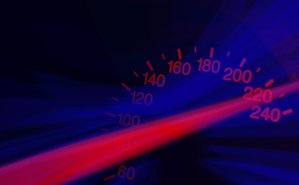The chicken-egg nature of speeding - Seed project in the spotlight
Interview with Amir Pooyan Afghari
With its seed funding program, the TU Delft Safety & Security Institute aims to increase the impact of safety & security research and education at TU Delft and to strengthen the position of TU Delft in this field. In this series of 'coffee chats', we talk to seed project leaders to find out what is happening.
What is the idea behind and the aim of your project?
 The idea behind this project came to me as a personal experience. I used to take a particular stretch of road to go from my house to TPM for almost 1 year and I was constantly harassed by many drivers on that road. They knew there is no speed cameras on that road, and they wanted to go over the speed limit. As a transport scientist, I did not want either myself or them to go over the speed limit. So, they would harass me on the road. I felt a lot of pressure and social influence and I wanted to do something about it. So, I wrote a proposal for this project aiming to investigate the effect of social influence and peer pressure on going over the speed limit and its ultimate safety consequences.
The idea behind this project came to me as a personal experience. I used to take a particular stretch of road to go from my house to TPM for almost 1 year and I was constantly harassed by many drivers on that road. They knew there is no speed cameras on that road, and they wanted to go over the speed limit. As a transport scientist, I did not want either myself or them to go over the speed limit. So, they would harass me on the road. I felt a lot of pressure and social influence and I wanted to do something about it. So, I wrote a proposal for this project aiming to investigate the effect of social influence and peer pressure on going over the speed limit and its ultimate safety consequences.
What disciplines are involved?
The project will bring together behavioural theories from social sciences, advanced statistical methodologies from data science, and transport applications from engineering.
What has been done and what is to come?
Speeding behaviour of drivers has been mostly investigated from engineering, psychological, and legal perspectives. However, the social aspects of speeding are largely unexplored, even though road sharing requires direct social exchanges between drivers (as was the case in my anecdotal experience). In particular, the chicken-egg nature of speeding has been overlooked: drivers want to go over the speed limit, they pressure you to speed so you go over the speed limit too, and now you are one of those other drivers contributing to this problem.
How can the TU Delft Safety & Security community help you?
The community has already helped this project by joining forces coming from three disciplines towards this proposal. It has also contributed to this project by providing the financial support for the experiments to be done later. But apart from these, TU Delft S&S community can play a key role in making a real-life impact on the society by disseminating the results of this project to stakeholders and policy makers such as city officials, the police, and the government.
When (with what result) will you look back at this project happy and with contentment?
I hope we (all brilliant scientists who are involved in this project) can provide scientific evidence for my anecdotal experience. I expect we can show (with some evidence) that there is a real sociotechnical problem on our roads which is coming from collective violation of traffic rules. This problem gets bigger and bigger because each individual contributes to it while being a victim of it. I hope we can use these initial results to dive deeper (in another larger scale project) on the underlying reasons and possible counter measures of speeding among drivers in the Netherlands and worldwide.
